Marathon Read Arrives at Penn State with Tales of “Borders and Belongings”

Penn State hosted its 11th annual Marathon Read event at the Pattee Mall on Sept. 21, celebrating the theme of “Arrivals.” Volunteers from Penn State, State College, and the surrounding community volunteered to read in 5-minute intervals during this 12-hour-long event. Participants read a variety of creative works that delved into essential themes of “immigration, assimilation, resistance, language diversities, and sustaining communities around the world,” according to this year’s poster.
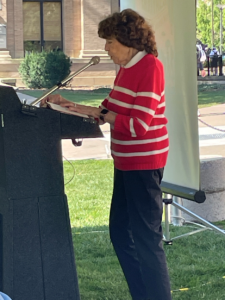
Notable readers included State College mayor Ezra Nanes, philanthropist Sue Paterno, and former Penn State women’s volleyball coach Russ Rose. Associate Deans Richard Page (Undergraduate Studies in the College of the Liberal Arts), Amy Allen (Faculty Affairs in the College of the Liberal Arts), and Scott Bennett (Research and Graduate Studies) also read.
The event kicked off at 9 a.m. with a warm welcome from co-organizers Dr. Forrest Finch, Assistant Teaching Professor of German Language, Literature, and Culture, and Romi Roman-Cabrera, Ph.D. candidate in Hispanic Linguistics. Reading selections were available in a multitude of languages, some with an English translation available, including Spanish, Arabic, Portuguese, Urdu, Italian, German, and more.
Roman-Cabrera expressed that “we have encouraged people from across the school of languages and culture to contribute with books that represent their department and culture.” While Roman-Cabrera admitted it was sometimes challenging to find texts available both in their original language and with an English translation, she hopes the event will encourage others to take language courses. “With the climate that we're going through right now politically and socially, I think it's very important that people get educated about arrivals, borders, and belongings,” she said. “We want to express this through different authors that have written different pieces on these things based on their own experiences.”
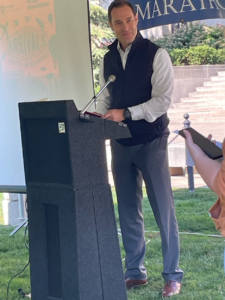
Finch commented on his selection of Voltaire’s Candide, which he chose because of its “canonical status.” He continued, “It's this Western great book but also…kind of a lighthearted journey. It's an enlightenment example of a journey story and even though it’s fancy canonical literature, the linguistic register is really accessible.”
Michael Calabrese, a fifth-year history student participating in the Marathon Read for the second year in a row, opted to read The Green Book by Muammar Al Gaddafi. “It’s about showing how you can make community out of a place as diverse as Libya with various peoples and how to help emerging nations actually create a system of democracy that helps them,” Calabrese explained.
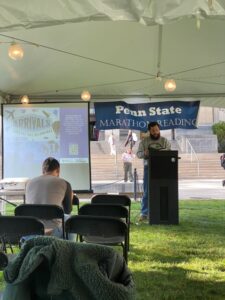
Jose Miguel Fonseca Fuentes, a Ph.D. candidate in Spanish and Latin American literature, attended the Marathon Read last year but read for the first time this year. His selection was Latin Moon in Manhattan by Jaime Manrique. “It was originally published in English, but I decided to read it in Spanish because it's very intertwined in Colombian culture.” Fuentes added, “Books can allow us to reflect on how, in different ways, we arrive in this country, and how we interact with people from other societies, including what we give and what we receive from others.”
Fourth-year material science and Italian student Isabella Ortolan read an adaptation of "Little Red Riding Hood" in Italian that has been passed down orally among her family for generations. Ortolan translated a portion of the story in Portuguese into English and Italian, which she said “represents the languages that my family has gone through in our immigration journey.”
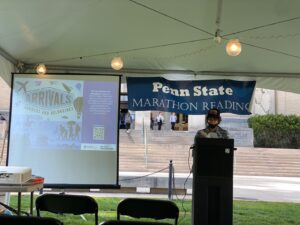
The event also showcased less modern or widely spoken languages. State College’s Old Norse Reading Circle read the Greenlander saga in Old Norse. Bill Whitesmith and Danielle Austin, both Administrative Assistants in the School of Global Languages and Literature, and undergraduate German and linguistics student Amanda Neyhart took turns reading from the saga. Whitesmith commented that the Greenlander saga “is a good introductory piece to translate because some of the Norse sagas can be a little difficult to translate.” Neyhart decided to pronounce the Old Norse, no longer a spoken language, with a German accent.
In addition to reading in Old Norse, Austin also read a selection in Irish Gaelic, singing the first verse of the piece. The song tells the tale of “an old woman who is basically on her deathbed and she's requesting her family to basically return her remains to a beloved homeland on the island in Ireland so her soul can arrive at peace where her family has basically lived for generations.” Austin noted that “despite the almost endangered status of the language” it is still meaningful to speak and hear it. “Really what it’s all about at the end of the day is sharing these languages and these themes that really are found everywhere and [provide] that reminder that we really are all the same.”
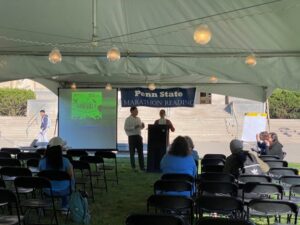
The Marathon Read was originally founded by two Penn State professors, Distinguished Professor of English Dr. Christopher Reed and Distinguished Professor of Comparative Literature Dr. Eric Hayot. Reed and Hayot remarked on how their original intent for the Marathon Read has carried on over the past decade-plus. Reed reminisced, “We wanted something that has the feeling of the tailgating: stay up all night, do something crazy but would be about academics.” Hayot stressed the importance of reading aloud by “occupying sonic space with the voices of students and faculty and also with the sounds of literature and different languages.”
Dr. Reed concluded with his favorite memory, recalling a late evening during a past Marathon Read when suddenly, a large group of Chinese-speaking students emerged from Pattee to listen to a speaker read a chapter in Chinese. “It just seemed like a magical moment where a facet of the university was suddenly aware of itself.”

Penn State hosted its 11th annual Marathon Read event at the Pattee Mall on Sept. 21, celebrating the theme of “Arrivals.” Volunteers from Penn State, State College, and the surrounding community volunteered to read in 5-minute intervals during this 12-hour-long event. Participants read a variety of creative works that delved into essential themes of “immigration, assimilation, resistance, language diversities, and sustaining communities around the world,” according to this year’s poster.

Notable readers included State College mayor Ezra Nanes, philanthropist Sue Paterno, and former Penn State women’s volleyball coach Russ Rose. Associate Deans Richard Page (Undergraduate Studies in the College of the Liberal Arts), Amy Allen (Faculty Affairs in the College of the Liberal Arts), and Scott Bennett (Research and Graduate Studies) also read.
The event kicked off at 9 a.m. with a warm welcome from co-organizers Dr. Forrest Finch, Assistant Teaching Professor of German Language, Literature, and Culture, and Romi Roman-Cabrera, Ph.D. candidate in Hispanic Linguistics. Reading selections were available in a multitude of languages, some with an English translation available, including Spanish, Arabic, Portuguese, Urdu, Italian, German, and more.
Roman-Cabrera expressed that “we have encouraged people from across the school of languages and culture to contribute with books that represent their department and culture.” While Roman-Cabrera admitted it was sometimes challenging to find texts available both in their original language and with an English translation, she hopes the event will encourage others to take language courses. “With the climate that we're going through right now politically and socially, I think it's very important that people get educated about arrivals, borders, and belongings,” she said. “We want to express this through different authors that have written different pieces on these things based on their own experiences.”

Finch commented on his selection of Voltaire’s Candide, which he chose because of its “canonical status.” He continued, “It's this Western great book but also…kind of a lighthearted journey. It's an enlightenment example of a journey story and even though it’s fancy canonical literature, the linguistic register is really accessible.”
Michael Calabrese, a fifth-year history student participating in the Marathon Read for the second year in a row, opted to read The Green Book by Muammar Al Gaddafi. “It’s about showing how you can make community out of a place as diverse as Libya with various peoples and how to help emerging nations actually create a system of democracy that helps them,” Calabrese explained.

Jose Miguel Fonseca Fuentes, a Ph.D. candidate in Spanish and Latin American literature, attended the Marathon Read last year but read for the first time this year. His selection was Latin Moon in Manhattan by Jaime Manrique. “It was originally published in English, but I decided to read it in Spanish because it's very intertwined in Colombian culture.” Fuentes added, “Books can allow us to reflect on how, in different ways, we arrive in this country, and how we interact with people from other societies, including what we give and what we receive from others.”
Fourth-year material science and Italian student Isabella Ortolan read an adaptation of "Little Red Riding Hood" in Italian that has been passed down orally among her family for generations. Ortolan translated a portion of the story in Portuguese into English and Italian, which she said “represents the languages that my family has gone through in our immigration journey.”

The event also showcased less modern or widely spoken languages. State College’s Old Norse Reading Circle read the Greenlander saga in Old Norse. Bill Whitesmith and Danielle Austin, both Administrative Assistants in the School of Global Languages and Literature, and undergraduate German and linguistics student Amanda Neyhart took turns reading from the saga. Whitesmith commented that the Greenlander saga “is a good introductory piece to translate because some of the Norse sagas can be a little difficult to translate.” Neyhart decided to pronounce the Old Norse, no longer a spoken language, with a German accent.
In addition to reading in Old Norse, Austin also read a selection in Irish Gaelic, singing the first verse of the piece. The song tells the tale of “an old woman who is basically on her deathbed and she's requesting her family to basically return her remains to a beloved homeland on the island in Ireland so her soul can arrive at peace where her family has basically lived for generations.” Austin noted that “despite the almost endangered status of the language” it is still meaningful to speak and hear it. “Really what it’s all about at the end of the day is sharing these languages and these themes that really are found everywhere and [provide] that reminder that we really are all the same.”

The Marathon Read was originally founded by two Penn State professors, Distinguished Professor of English Dr. Christopher Reed and Distinguished Professor of Comparative Literature Dr. Eric Hayot. Reed and Hayot remarked on how their original intent for the Marathon Read has carried on over the past decade-plus. Reed reminisced, “We wanted something that has the feeling of the tailgating: stay up all night, do something crazy but would be about academics.” Hayot stressed the importance of reading aloud by “occupying sonic space with the voices of students and faculty and also with the sounds of literature and different languages.”
Dr. Reed concluded with his favorite memory, recalling a late evening during a past Marathon Read when suddenly, a large group of Chinese-speaking students emerged from Pattee to listen to a speaker read a chapter in Chinese. “It just seemed like a magical moment where a facet of the university was suddenly aware of itself.”